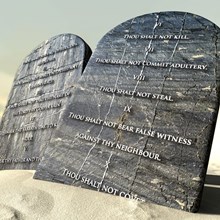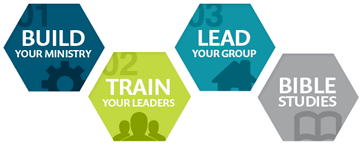A.W. Tozer says in The Knowledge of the Holy, "What comes into our minds when we think about God is the most important thing about us." The Ten Commandments are still relevant 3,500 years after they were first given at Mount Sinai. The major function of the Ten Commandments is to reveal who God is. Who someone is can best be understood by knowing what matters most to him. Obeying these commands from God, or not, is always a matter of response to who he is more than a matter of morality. In this study, we will approach the Ten Commandments as autobiographical, self-revelatory messages from God about who he really is, and how he wants our lives to change by knowing him. Note: This study was developed with Community Christian Church and New Thing Network.
Session One
You Shall Have No Other Gods Before Me
God will not be second.
Exodus 20:1–3; 1 Samuel 5:1–6; John 14:6–7; Revelation 2:1–6
In this study we will ask: Do we receive meaning and value from a Creator who bestows our identity? Or must we self-construct our own private, supreme being "Franken-god"?
Session Two
You Shall Not Make for Yourself an Idol
God refuses to be reduced.
Exodus 20:4–6; Acts 17:16–29
This study shows that God not only cannot be made into a physical likeness, but He cannot be manipulated and bargained with, as are all false gods.
Session Three
You Shall Not Misuse the Name of the LORD
God is never to be taken lightly
Exodus 3:13–15, 20:7; Matthew 5:33–37; Acts 5:1–11, 8:9–24
Profanity is taking God lightly, and this study examines why he will not allow that.
Session Four
Keep the Sabbath Holy
God can be trusted and enjoyed.
Exodus 20:8–11; Matthew 11:28–30; Colossians 2:16–17
This study emphasizes that we don't always have to work in a frenzied panic to make ends meet or to accomplish the many things we feel we have to get done, and that enjoyment in life is found through God.
Session Five
Honor Your Father and Mother
God cares about your parents.
Exodus 20:12; Deuteronomy 6:4– 9; Matthew 22:36–40; Ephesians 6:1–4
This commandment is a crash course in God's school of grace, one that for many people has included many painful hard knocks.
Session Six
You Shall Not Murder
God places great value on human beings.
Genesis 4:1–16; Matthew 5:21–24
This study looks at Jesus, who tells us that murder begins in our hearts and that we shouldn't feed our anger.
Session Seven
You Shall Not Commit Adultery
Marriage is sacred to God.
2 Samuel 11:1–5, 14–17, 12:1–10
The prohibition against adultery is similar to the prohibition against murder: it is wrong not just because of what it does to another person, but because it is an affront to God.
Session Eight
You Shall Not Steal
Everything belongs to God.
Psalm 50; Malachi 3:8–10
This study looks at the fact that stealing is a form of greed, and greed is counting on money—instead of God—to make us secure.
Session Nine
You Shall Not Give False Testimony
Our relationships with others should be based on truth, honesty, and trustworthiness.
Psalm 26:3, 31:5; Isaiah 65:16; John 8:31–32; Ephesians 4:1–3, 15
In the Book of Proverbs, God says there are seven things he hates and lying is two of them! This study examines how lying is an attack on the very heart of relationships: the ability to count on one another.
Session Ten
You Shall Not Covet
God alone is our satisfaction.
Exodus 20:17; 1 Kings 3:16–28; Job 22:21–30; James 4:1–3, 6–8
When God commands us not to covet what we don't have, He is telling us that what we truly need most is always Him, and that nothing else can truly satisfy us, no matter how good someone else's things or life looks to us.
Total number of pages—73





